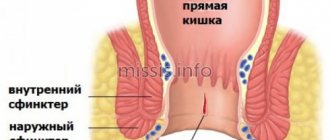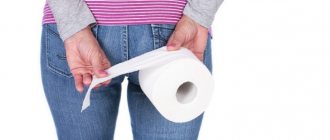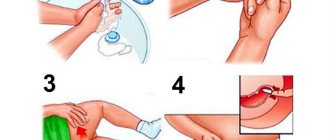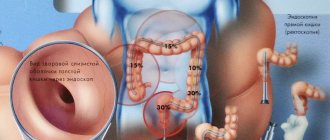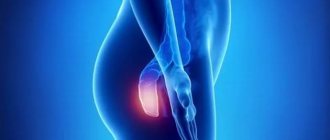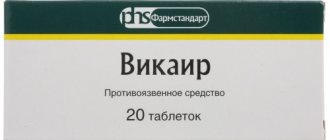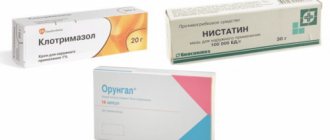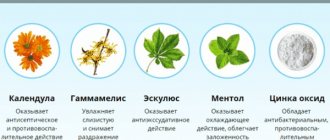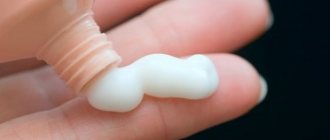There are inconvenient problems, talking about which is bad manners even if you are among friends or family. Itching of the anus is the first thing among them. Unpleasant sensations in such an intimate area are sometimes so intense that a person tries to independently find an opportunity to get rid of them and drives away the thought of going to the doctor. Meanwhile, anal itching is often the first bell indicating that serious problems with the intestines have begun. Let's try to figure out what causes the problem and what ointment treatment should be used.
Causes of itching in the anus
First of all, you need to pay attention to when the tickling sensations appear and why they subside. If itching occurs a little later after defecation and is relieved by a regular shower, then most likely we are talking about normal skin irritation due to insufficient hygiene. It may also happen that the discomfort is associated with wearing poor underwear, such as thongs, so beloved by many ladies. Itching can also be explained by:
- stress,
- excessive sweating,
- food addictions when they eat a lot of spicy and smoked foods.
If the itching increases and does not disappear even if all hygienic conditions are met, we may be talking about more serious problems. And the first place among the causes is hemorrhoids. You may also suspect something from the list:
- allergy,
- urinary tract infection,
- anal fissure,
- worm infection,
- fungal infection
- diabetes.
Itching can spread around the tissues surrounding the anus, and can be felt both outside the opening and inside. It is also varied in intensity: at a certain time it can increase, and when conditions change, on the contrary, it can subside. Often, along with itching, a person also feels many other symptoms: pain, burning, secretion. When palpated near the anus, in some cases, swelling develops, compactions appear, and the skin becomes inflamed.
Varieties and symptoms
Depending on the clinical course of the disease, there are several forms of anal itching:
- Acute - characterized by pronounced symptoms, the appearance of swelling and irritation in the anal area, and sometimes bleeding. Signs often occur abruptly;
- Chronic - in this case, the discomfort increases gradually. If itching persists for a long time, this can lead to infection of the tissue in the anal area. And this is fraught with the occurrence of inflammatory processes that can cover the rectum and spread further.
Diagnostics
Of course, such a problem causes embarrassment, but it must be voiced at an appointment with a proctologist. Not noticing discomfort or treating itching in the anus with suppositories on the recommendation of a pharmacist from a pharmacy is a waste of time and, moreover, can worsen your health. Before going to a proctologist, convince yourself that all the manipulations he will do will go quickly and will not cause much pain. All that remains is to step over your own shame. The doctor will examine the problem area and, based on what he sees, prescribe:
- endoscopic examination,
- mucosal biopsy,
- proctography,
- sigmoidoscopy.
Read also: Itching in the vagina, why the vagina itches, treatment
In some cases, if the proctologist does not see a problem that is within his competence, he recommends turning to other specialists. This could be a gynecologist, endocrinologist, or dermatologist. Sometimes, a symptom is caused by a combination of several pathologies, but in any case, consult a therapist and bring him the following results:
- stool analysis,
- blood for sugar
- testing for sexually transmitted infections.
How does infection occur?
Infection occurs with the help of one person who infects himself, and in some cases, those around him. In turn, during examination, eggs can actually be found on the surface of bed or underwear, dust that flies in the room. There are especially many worms under the nails, if they are not cut short, when the child scratches the anus, especially in his sleep. Getting into the child's mouth from the surface of toys, but most often unwashed hands or everyday items, food, water, worm eggs begin a new life cycle of their development.
What should the properties of the ointment be?
Pharmacies offer a variety of ointments for anal itching. To understand exactly which of them will help, you should, first, determine the diagnosis that caused this complaint. Secondly, understand the properties that the medicine has. The anti-itch component alone is not enough. It is important that the drug acts in a variety of ways:
- as an anesthetic to relieve pain
- as an anticoagulant to prevent blood clots,
- as an anti-inflammatory agent,
- as a stimulant for skin restoration.
It’s good if the product also has an antiallergic effect and at the same time protects against germs. Not every ointment against itching in the anus meets these requests. Basically, most drugs have 2-3 properties.
Symptoms
The general condition of a person depends on how many helminths enter the human body during infection. There is a category of people who do not experience pain during infection. First of all, parents should be alerted to itching and burning in the anal area in the evenings, and most often at night.
When there are a lot of parasites, the itching becomes simply unbearable and bothers the child not only at night, but also during the day in the genital area, abdomen and thighs. A person infected with pinworms begins to sleep poorly, becomes irritable, develops weakness, and, on the contrary, his performance decreases.
A child with enterobiasis becomes capricious, whiny, eats and sleeps poorly. Such children quickly get tired, they suffer from headaches, and what attracts attention is that they quickly lose weight.
If pinworms enter the urinary system, adults may experience urinary incontinence at night. Cases of endometritis caused by pinworms have been described. The disease provokes a disruption of the normal functioning of the stomach, a person complains of pain and rumbling in the abdomen, added to this are nausea, vomiting, the inability to empty the intestines or too frequent stools with mucus, in rare cases there may be blood.
If you suspect a helminth infection, you should urgently consult a doctor at the clinic. There, a scraping is taken from the perianal folds, the material is examined by the laboratory, the main thing is to collect it before defecation, when all the eggs are in their places.
Using suppositories for discomfort
Unfortunately, not all people seek treatment in time when they experience itching in the anus. Time passes, the disease worsens, and then the ointment becomes useless for therapy. It is necessary to resort to more effective means, for example, using suppositories for anal itching. It is also important to make an effort to change your eating habits and increase your physical activity.
- Hepazolon suppositories. They contain substances that work as anesthetics - prednisolone and lidocaine. Another component, heparin, directs its action to improve local blood supply, preventing the blood from thickening and forming such dangerous blood clots.
- Acylact suppositories. If you are itching due to urogenital infections, then you should remember this name of the suppositories - Acylact. The main active component, live lactobacilli, provides an environment inside the body that kills most bacteria: both pathogenic and conditionally pathogenic.
- Relief candles. The composition of the medicine is entirely a variety of plant components. These components have, first of all, an anti-inflammatory effect. At the same time, suppositories improve tissue regeneration and stimulate the immune system.
Treatment
Treatment of itching comes down to eliminating the causes of its occurrence. The treatment plan is selected depending on the factors that caused the problem. Therefore, when identifying:
- Diseases of the rectum - the doctor selects a course of therapy to treat a specific pathology;
- Antihelminthic drugs are prescribed for parasites;
- Infections - in most cases, antibacterial therapy is used;
- Allergies - antihistamines are selected;
- Skin diseases - ointments with a drying effect are used.
The doctor also prescribes special medications, the action of which is aimed at reducing the itching itself. At the same time, it is important to observe the rules of personal hygiene and exclude from the diet foods that can cause itching.
Prevention of anal diseases that cause burning and itching
The main rule for preventing irritation of the anus with diarrhea is to carry out regular hygiene procedures, replacing toilet paper with soft napkins. To prevent diarrhea, the following should be observed:
- wash your hands before eating and after going outside or visiting the toilet;
- subject meat and fish products to thorough heat treatment;
- wash vegetables and fruits well, preferably in soapy water;
- drink only boiled water;
- eat only fresh food;
- monitor the expiration dates of products;
- It is advisable to avoid nervous tension.
What diseases cause anal itching?
Anal itching may be accompanied by the following diseases:
- proctological direction (proctitis and proctosigmoiditis, hemorrhoids, chronic paraproctitis, cryptitis, insufficiency (incontinence) of the anal sphincter);
- gynecological direction (PID);
- viral direction (genital warts);
- fungal diseases (actinomycosis, thrush);
- bacterial diseases (helminthic infestations, pubic lice, scabies);
- skin diseases (psoriasis, seborrhea, inflammation of the sweat glands, atopic dermatitis, eczema, lichen planus);
- diseases with metabolic disorders (diabetes mellitus, liver failure, pancreatitis).
Mandatory
It is necessary to constantly ensure that the child has clean hands and cut his nails short, this will help eliminate the causes. In the morning and evening, you must constantly wash yourself using warm water and soap. Before going to bed, it is recommended that the child wear panties that fit tightly to his body, and change them for new ones in the morning. Afterwards, the panties are washed and must be ironed with a hot iron. The bed linen itself is also treated with a hot iron, immediately after the child sleeps.
The apartment is constantly wet cleaned, and toys and pots must be doused with boiling water after use.
There are many reasons why itching occurs and they are all varied. Some are trivial and easy to deal with on your own, but there are others that will require a doctor’s intervention and special diagnostics. In any case, it is better to visit a doctor and determine the true cause of the discomfort.
How to prevent itching?
Treatment of itching with hemorrhoids should always begin with general measures: dietary, routine and hygienic.
Diet
First of all, you need to make sure by all means that the feces are not hard and come out easily. After all, constipation is the most faithful assistant to the disease and the cause of itching with hemorrhoids. The problem of constipation should be solved by correcting nutrition. Preference should be given to foods high in fiber. These include: fresh and cooked vegetables (especially beets), fruits (prunes, fresh plums), wholemeal bread with bran, fermented milk products.
You should avoid eating spicy, sour, fatty foods, smoked foods, pickled foods, chocolate, alcohol, and coffee. These products provoke an exacerbation of inflammation - the itching of the hemorrhoids intensifies, and they begin to hurt.
We should not forget about the drinking regime, because feces become very dense with insufficient fluid intake. You can eat fruit drinks, compotes made from dried fruits and berries.
It is optimal to drink up to 2 liters of clean water per day
Correct defecation
Few people realize that the reason for the appearance of this symptom in hemorrhoids lies in the wrong approach to the process of bowel movement. This is quite natural, because it is not customary to talk about such an intimate matter as the act of defecation. Moreover, there are some rules for its implementation. However, without following some recommendations, you will not be able to remove the itching.
During defecation, a person should not strain, as this leads to the filling of hemorrhoids with blood. They become even more enlarged and injured. Feces should be expelled during one opening of the sphincter, lasting no more than a minute.
Attention! Sitting on the toilet for a long time is fraught with enlargement of hemorrhoids due to the fact that blood rushes to them.
Hygiene after using the toilet
After defecation, a person with hemorrhoids must thoroughly wash the anus and perineum area. Most patients note that after washing this area in the anus, itching is much less.
You can treat itching by washing with running water and regular baby soap. It is advisable that the water be cool, since exposure to low temperatures helps to tone the venous and arterial vessels. Accordingly, less blood flows through spasmodic arteries, and toned veins make it possible to more effectively regulate the outflow of blood. You can direct the water stream to the perianal folds, then a massage effect is added, which also helps to reduce hemorrhoids after defecation.
Cool water tones the hemorrhoidal cavernous plexuses
In conditions where it is impossible to wash, it is recommended to use wet wipes. Under no circumstances should you scratch the anal area if you have hemorrhoids. Why? After all, this brings relief to many. It's all about additional trauma to external nodes and possible infection. In addition, the effect of this action is very short-lived. It’s better to wash yourself once again than to constantly itch.
Attention! Infection of hemorrhoids can lead to such a serious complication as paraproctitis.
Exercises for hemorrhoids
Strengthening your pelvic floor muscles can be effective in reducing the appearance of hemorrhoids. In addition, when performing gymnastics for these muscles, the rectal sphincter is strengthened, and this is important for patients who have its insufficiency. The advantage of this complex is that it can be performed almost anywhere without anyone noticing.
At first, some people do not understand which muscles need to be contracted. To do this, you just need to sit on the toilet while urinating and try to hold the stream of urine. By feeling the tension in the perineum, you can understand which muscles should be tensed and trained outside of urination. It is recommended to perform contractions in two modes: slow and fast. Each exercise is performed 15 times, 4-5 times a day or more.
Over time, the muscles will get stronger, and doing gymnastics will become very easy. In addition to reducing hemorrhoids, this set of exercises allows men to improve erection, overcome prostate problems, and women to increase sensitivity during sexual intercourse.
Drug therapy
A proctologist will tell you how to get rid of itching from hemorrhoids. It should be noted that there are no drugs that treat only this symptom. Without treating its main cause—the disease itself—itching cannot be eliminated. Local preparations for the treatment of hemorrhoids most often contain several components that have different directions of action:
- anti-inflammatory;
- pain reliever;
- antithrombotic;
- angioprotective;
- venotonic.
Before relieving the itching of hemorrhoids, you should determine what type of nodes the patient has. After all, the choice of dosage form of the drug depends on this. For external localization of nodes, ointment is used, and for internal localization, suppositories are used. If you have an applicator for rectal administration, ointment can be used for internal hemorrhoids.
Attention! Only a doctor can prescribe medication for hemorrhoids. Self-medication is unacceptable!
A pronounced antipruritic effect is exerted by such components of drugs as local anesthetics (Benzocaine, Cinchocaine, Lidocaine) and glucocorticosteroids (Hydrocortisone, Fluocortolone). The following drugs are used for drug therapy:
- Procto-glivenol;
- Ultraproct;
- Relief Advance and Relief Ultra;
- Proctosan Neo;
- Proctosedyl;
- Nigepan;
- Betiol;
- Anuzol.
Local drugs are prescribed in a short course lasting no more than 7-14 days
Local medications should be used after defecation and toileting of the anal area. The ointment is applied in a thin layer to the external nodes with a finger or inserted into the rectum using an applicator. Suppositories are inserted deep into the anal canal.
In addition to local therapy, venotonics (Detralex, Phlebodia) and anti-inflammatory drugs (Nimesil, Diclofenac) are used in the complex treatment of hemorrhoids.
Types of anal itching
In proctology, a distinction is made between primary and secondary anal itching.
Primary anal itching is an itching for which scientists have not yet identified any apparent causes.
Secondary anal itching may appear as one of the symptoms of some diseases. For example, a similar condition may accompany the following diseases:
- haemorrhoids;
- chronic anal fissure;
- helminthic infestation;
- proctitis, proctosigmoiditis and other intestinal diseases;
- inflammatory diseases of the intimate area;
- fungal infection of the anal area and perineum;
- burn or mechanical injury to the anus (for example, if there is a foreign body in the intestine).
